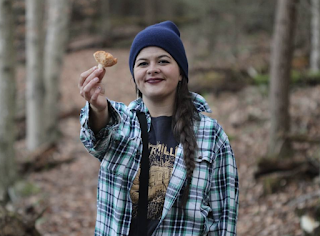 |
| Whitney Johnson of Lawrence County, Kentucky, is a dedicated forager. (Courtesy photo via Herald-Leader) |
People like Johnson are opting to stay in the hollows and hills and build up their communities. "Johnson can't imagine living anywhere else. Eastern Kentucky, and more specifically Lawrence County, is home, and she's proud of that — so much so she has the word 'Appalachian' tattooed on her arm," Childress writes. "Johnson shows the pride she has for her roots in more than just ink. She also broadcasts it to the over 740,000 followers that watch her TikTok account, appalachian_forager. As the name suggests, Johnson's videos show her foraging for mushrooms and other local, edible plants — like pawpaws. . . . She also recently pet a possum."
Since the 1950s, Eastern Kentucky's population has decreased "as the number of local jobs tied to the coal industry has plummeted," Childresss notes. "Meanwhile, the state's non-Appalachian counterparts grew by 5%. Worries over young people leaving the region and headlines warning of rural 'brain drain"' have accompanied population loss." However, "In the past decade, Eastern Kentucky hasn't seen the same population decline as Appalachian counties in Ohio, Pennsylvania and West Virginia." Chris Green, the director of the Loyal Jones Appalachian Center at Berea College, told Childress that Eastern Kentucky is "really a place of opportunity for educated youth who are encouraged to connect with where they're from, and bring those skills in."
In 2008, Berea "surveyed 169 students who hailed from Appalachia on how likely they were to live in Central Appalachia after graduation and what factors might determine their decision," Childress reports. "The study found that students from counties considered more economically challenged were generally more likely to say they wanted to stay, 'possibly indicating a higher attachment to the region.' Strong family ties also increased the attachment to Appalachia."
Luke Glaser, who is both a high school teacher and a Hazard city commissioner, encourages students to buck the Appalachian stereotypes. "His precalculus curriculum, he said, trains students to be problem solvers," Childress writes. Glaser told Childress, "We're not in effect learning exponents because we're going to use exponents when we get into our professional career. We're learning exponents because we're training our minds how to solve the big problems."
 |
| Stacie Fugate the Coordinator of InVision Hazard in downtown Hazard (Photo by Silas Walker, Herald-Leader) |
Glaser told Childress, "Kids are certainly proud to be from here. They're certainly thinking about what it means to be from here in ways that they weren't 10 years ago."
No comments:
Post a Comment